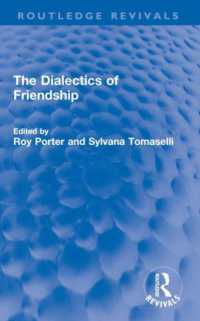- ホーム
- > 洋書
- > 英文書
- > Religion / Ethics
Full Description
While the Neo-Confucian critique of Buddhism is fairly well-known, little attention has been given to the Buddhist reactions to this harangue. The fact is, however, that over a dozen apologetic essays have been written by Buddhists in China, Korea, and Japan in response to the Neo-Confucians. Buddhist Apologetics in East Asia offers an introduction to this Buddhist literary genre. It centers on full translations of two dominant apologetic works-the Hufa lun ( ), written by a Buddhist politician in twelfth-century China, and the Yusok chirui non ( ), authored by an anonymous monk in fifteenth-century Korea. Put together, these two texts demonstrate the wide variety of polemical strategies and the cross-national intertextuality of East Asian Buddhist apologetics.
Contents
ContentsPart 1: Introduction1 Early Chinese Buddhist Polemics2 The Neo-Confucian Critique of Buddhism3 Buddhist Responses to the Neo-Confucians 4 Apologetic Strategies and ThemesPart 2: Translations1 In Defense of the Dharma: Annotated Translation of Zhang Shangying's Hufa lun ( )2 Probing the Doubts and Concerns between Buddhism and Confucianism: Annotated Translation of the Yusok chirui non ( )BibliographyIndex






